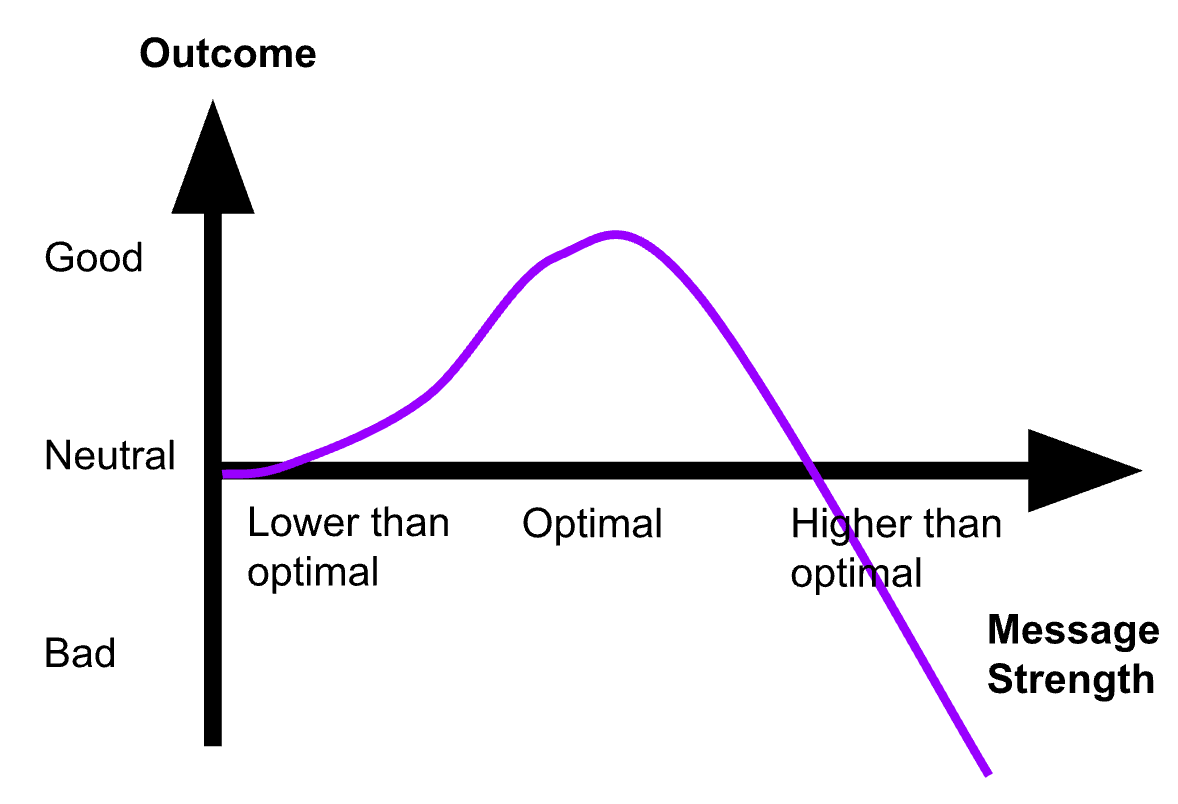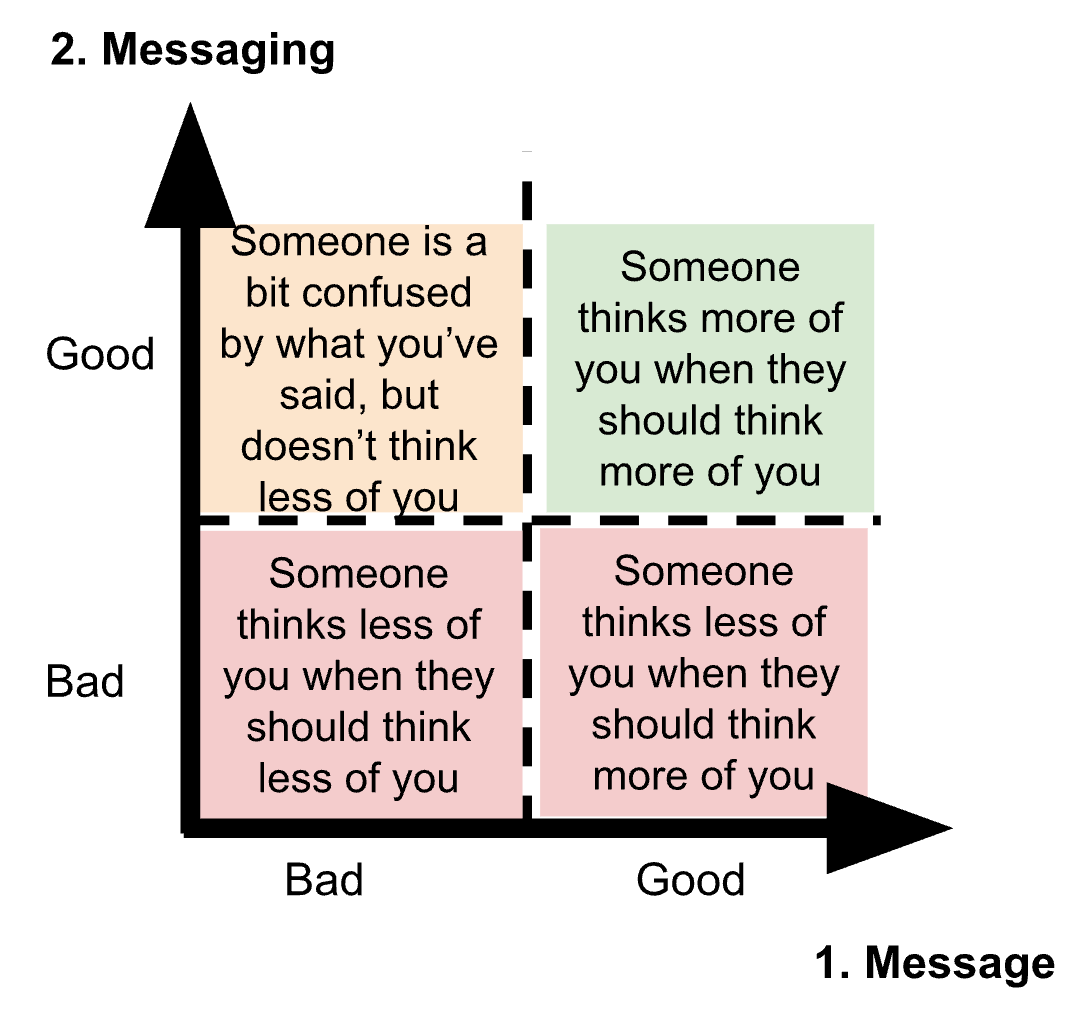Optimal Message Strength: When in doubt, go lower.
Reading time: 5 mins
Summary:
If you want to raise a proposal, you can have ‘Messaging Strength’ vary from 0% => 100%.
There is normally an ‘Optimal Messaging Strength’ to use.
Messaging Strength too strong: Can mean your proposal is rejected when it should be considered and make you look bad.
Messaging Strength too weak: Can mean your proposal is heard but not actioned when it should be actioned but it’s unlikely to make you look bad.
Messaging Strength that is optimal: Can mean your proposal is heard and actioned and should make you look helpful.
Optimal Messaging Strength can be 25%, Optimal Message Strength can be 100%.
I try to think about what the Optimal Messaging Strength should be. E.G. Do I want to say with with 25% strength or 75% strength?
If it’s the first time I’m saying something then normally start with low Messaging Strength. If I’m in doubt about the Optimal Messaging Strength, then normally I go weaker.
See examples of Messaging Strength below.
I think there is an asymmetric payoff between over vs under Messaging Strength. All else equal, I recommend erring to under Messaging Strength and then ramping (AKA start lower and then increase).
Normally you can lower Messaging Strength more than you think.
Before bringing something up I try to:
1. Ask myself what the Optimal Messaging Strength is? E.G. If this is the first time I’m saying something it should likely have low Messaging Strength.
2. Try to figure out ways to ask something with lower Messaging Strength, or ask ChatGPT to help with suggestions!
Jingle: If you want messaging to be a strength, figure out how to make messaging weak!
When in doubt, tell the truth. When not in doubt, tell the truth.
Optimal Message Strength: When in doubt, go weaker.
++++++++++
Details
Message Strength can vary form 0%-100%
You are normally going to get the chance to say something more than once. You are normally going to need to say something more than once.
E.G. 1: Let’s say you think you deserve a raise.
0% Messaging Strength:
You don’t say anything and somehow expect the other person to know you believe you deserve a raise. I think it’s best to assume that if you haven’t said something the other person is unaware you are thinking it.
25% Messaging Strength:
I believe I’ve been stepping up and adding more value. Can we have a chat about career progression in our next 1:1?
50% Messaging Strength:
I believe I’ve been stepping up and adding more value. When would you think it might be appropriate for me to be thinking about a raise?
75% Messaging Strength:
I believe I’ve been stepping up and adding more value. I’d like to talk about the possibility of me getting a raise in the next round of reviews.
100% Messaging Strength:
I believe I’ve been stepping up and adding more value. I believe I deserve a raise in the next round of reviews and if I don’t get one I’ll be looking elsewhere.
E.G. 2: Let’s say you feel constructive feedback should be provided to someone.
0% Messaging Strength:
"Hey, I caught your presentation today. You clearly put a lot of work into the content, and you know I always enjoy your slides."
(This is very gentle and doesn't actually convey any improvement feedback; it's simply a positive comment.)
25% Messaging Strength:
"I watched your presentation, and you've got some great content. I think with a bit more practice on the delivery, it could be even more engaging!"
(This is still quite gentle but introduces the idea that there is room for improvement without being specific about what needs to change.)
50% Messaging Strength:
"Your presentation had solid content, but I noticed you seemed a bit uncomfortable with the Q&A session. Focusing on that could really help your overall delivery."
(This feedback is more direct, pointing out a specific area that could be improved, but it's still said with a positive spin.)
75% Messaging Strength:
"The content of your presentation was good; however, your delivery wasn't as strong as it could have been. You should work on your speaking confidence, particularly during Q&A, to ensure you're conveying your points effectively."
(This is quite straightforward and specific about where improvement is needed, making it clear that the delivery was a weak point.)
100% Messaging Strength:
"Your presentation content was on point, but your delivery was lacking. You need to improve your engagement with the audience and handle the Q&A with more confidence and control. We can't afford to leave room for doubt in our client's minds."
(This is very direct, highlighting the deficiencies without softening the blow, and emphasises the potential consequences of not improving.)
Outcome = Message * Messaging
Good outcome = Message that should be bought up (good message) + Brought up in a good way (good messaging)
Problem type 1: An idea that should be brought up is not brought up.
Problem type 2: An idea that should be brought up is brought up in a way that means it is rejected.
I think ‘Messaging Strength’ being too high is a core way to mess up Messaging.
One example of Poor Messaging = Used Messaging Strength > Optimal Messaging Strength
Normally it’s best to start lower for Messaging Strength, then move higher
The first time you say something E.G. start at 25% strength. Then move to 50% if something isn’t addressed and you believe it should be. Then 75%, and then possibly 100%.
If you start too high I can find that the side receiving the message can find someone ‘indignant’.
E.G. 1 - You want a raise.
If you’ve never bought up wanting a raise before and you start with ‘75% confidence I think I deserve a raise at the new review’ then someone might not just not agree, they think the way you raised wanting a raise is a reason you don’t deserve a raise.
If Used Messaging Strength is greater than Optimal (Appropriate) Message Strength, an idea that is good can be received badly.
E.G. 2 - Providing constructive feedback to someone.
If you’ve never talked to someone about this particular area of constructive feedback and the first time you say with ‘High Messaging Strength’ “Your presentation delivery is lacking” the other person might well think you are ‘d1ck’ instead of hopefully hearing helpful feedback.
It is typically much easier to say something another time with increased Messaging Strength than it is to undo someone having a poor impression of you.
Related blogs
If you only take one thing away
I used to think ‘message was the hard part’. And I’m not saying getting ‘Message’ right is easy.
But, I think I've personally had more problems for myself and for others from ‘poor messaging’ than ‘poor message’.
One strategy I’ve found helpful for improved Messaging is to lower Messaging Strength.


